My contribution: Interview, Observation, Co-design workshop, Ideation, Prototyping, UI design
Time: Oct, 2018 - Jan, 2019
Project Type: School Group Project
Team: Yingxia Lou, Weiyi Meng, Christine Lu, Jing You
How might we change the currently one-way communication from musicians to listeners to a mutual relationship?
Music is regarded as the universal language that can surpass all kinds of distinctions. Music benefits people in various ways, for example, building emotional resilience, getting inspirations, and experiencing the feeling of resonance. However, a lot of musicians are having a hard time keeping mentally fullfillment and a financially successful career out of music, which largely is attributed to the lack of supports from listeners. Currently, the relationship between musicians and listeners is mostly an one-way communication from musicians to listeners, lacking meaningful feedback from listeners to musicians.

Echoes is an feeling-centered music platform that encourages listeners to share their feelings and stories, fostering mutual communication between musicians and listeners.









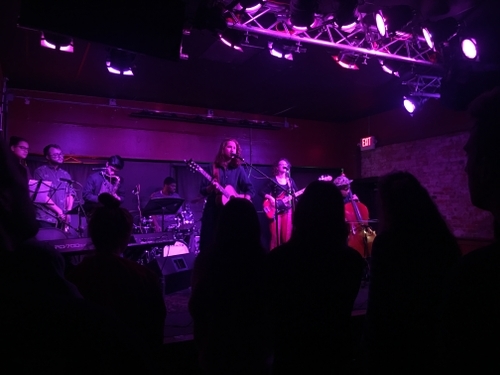
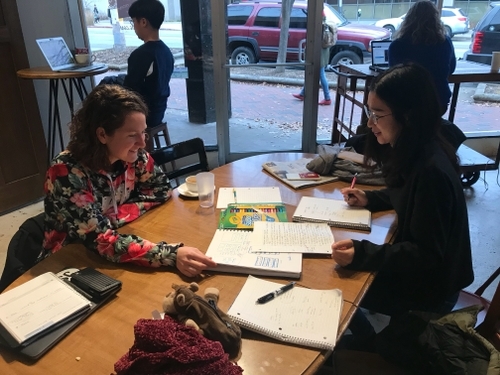

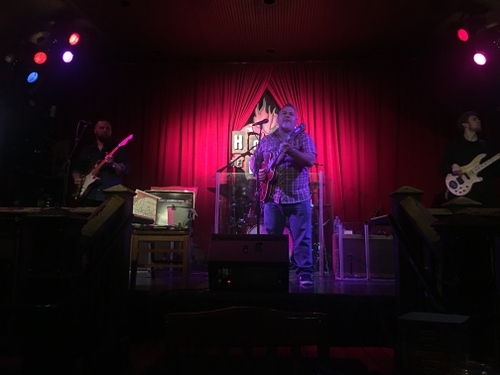
Interviews & Observations
Why is mutual relationship important?

Musicians are eager to hear from their listeners
The success of a musician highly depends on their relationship with listeners. According to our interviews with musicians and secondary research, we concluded that for musicians, mutual relationship is critical because of three reasons:
(1) the fulfillment of self-actualization;
(2) a way to promote their work
(3) a source of inspiration
Interviewee's quotes
“They want to be social but also don’t want to embarrassingly promote themselves”.
“I used a lot of audience feedback....learning and transfer those to my new album indirectly.”
"When you wrote a song that yourself can connect to and people like it, it feels so special because it’s like “this is my heart and you’re singing along to a piece of me.”

Listeners want to share their feelings
Most listeners we interviewed said sometimes they do want to share their feeling with others to get resonance. Telling a story about a song is not only a way to give feedback and support, but also a way of self-expression. If they know that there is a possibility that musicians could see what they have shared and interact with them directly, they will have a strong feeling of mutual understanding.

Interviews & Observations
What has prevented the mutual relationship?

Musicians do not have suitable channels to get meaningful feedback

Offline feedback is usually more meaningful and deep but limited in number.
Currently, they get deep feedback mostly in live performance. But this kind of feedback is relatively small due to physical limitation.

Online feedback is not meaningful and authentic enough.
The feedback musicians get from existing online platforms, such as Youtube, Spotify and Instagram, are mostly too abstract or irrelevant to their music. They can only know people like it or not but know little about how and why. “It’s weird that people listen to your music, but you don't know them”

Listeners do not have enough motivation and confidence to share feelings

Lack of motivation
Listeners mentioned that one reason they rarely give feedback directly to musicians is that they think musicians are unapproachable, and “they won't want to read it”.
Lack of confidence
Even when they feel strongly about a song, they don’t know where and how to express them. They feel like they are "not artist or writer" and cannot fully their convey feelings.
Interviewee's quotes
"A lot of times we can’t express what the music is like through words, we can only talk about genre.”
“I don’t think they want to read my feeling”
“If she is not that much popular, maybe I will try, but that rarely happen, I just feel like they are untouchable"
Co-design workshop
What are the possible ways?
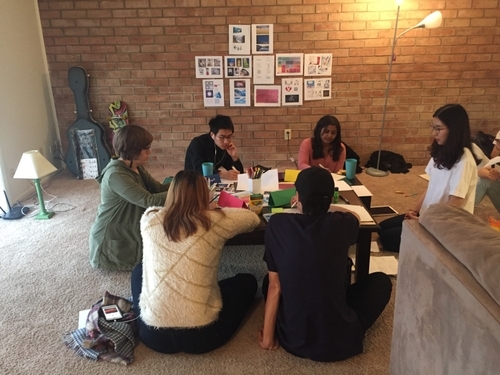
In order to explore ways of facilitating mutual communication between musicians and listeners, we organized a workshop and invited a group of listeners with diverse music-listening habits and music tastes to co-design ways to express personal experience related to music. In this workshop, we mainly explore these two aspects:
1. Forms and content of feelings
2. Motivation of sharing feelings
and we got some insights in both aspects.
Forms and content of feelings

The form of feelings could be either visual or verbal; it could also either be abstract or concrete.

When the feeling is produced with more effort, both the shared person and the person being shared will feel like it's more valuable.

Give some prompts or provided elements would lower the barrier of producing feelings but still allow the feedback to be personalized and emotional enough.
Motivation of sharing feelings

Listeners can be motivated to document their personal experiences related to music as a personal record for the purpose of memory keeping

Listeners can be motivated to read others’ personal experience by new discovery of music based on people’s thoughts instead of the analysis of objective attributes done by algorithms

Listeners can be motivated to share their personal experiences if musicians read them and give feedback.


Brainstorming

We did several rounds of brainstorming to explore possible forms and contents of feelings based on the insights we got from both musicians and listeners.
Semantic Differential
Balance the meaningfulness and required effort of the feelings
Based on our research, we can see one of the key problem we need to figure out is how to balance the meaningfulness of the feelings for both musicians and listeners and the effort required for listeners to produce them. We analyzed this with semantic differentials.

As we can see from the matrix, most meaningful feelings require extra effort from listeners. Actually the effort they are paying is one of the factors that makes it more valuable. Finally we decided to combine Music stories and Music memory diaries together to balance the meaningfulness and required effort. Though music stories would require more effort, but we could provide prompts or predesigned elements to make it easier.
Wireframes
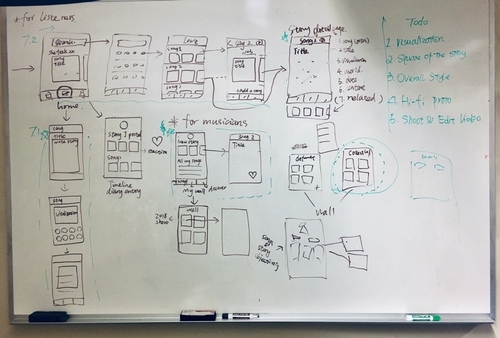
To quickly validate the concept, we straightened out the key user flow on whiteboard.
User Test
Then we tested the sketched prototype with two musicians and five listeners. It was quite exciting that almost everyone told us they like this idea, and we got lots of feedback.

"I'm exciting about reading their stories and interacting with them"
Musicians are exciting to interact with listeners in such an emotional way. They believe that stories would bring new meaning to their music.
"I hope I could use these storeis on my website"
Musicians mentioned that these stories would be a great way to spread their work and engage new listeners. They hope these stories could be collected and used for other purposes.

"I still feel like it's not that easy for me to write a story"
Although we provided visual elements and lyrics prompts, some listeners still feel that writing a story requires a lot of efforts. They still feel the barrier is not low enough, which means the frequency of writing stories would be very low.
"Reaction from musicians is exciting, but I also want to have more interaction with other listeners"
Besides just reading and react to other listeners' stories, listeners feel that it would be easier to get resonance if they could have more ways to interact with other listeners.
Based on the analysis of the feedback, we made some design decisions to iterate our concept:
1. Add another level of feeling: impressions, which is easier to express for listeners
2. Add more ways for musicians to collect stories and using the data
3. Add ways for listeners to interact with each others' feelings

Prototype & Userflow
Coming soon...